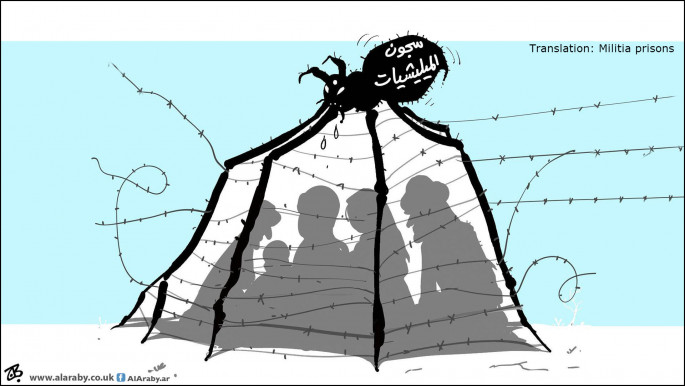Libya's new generation of disappeared
It was while browsing a Facebook page dedicated to the Libyan revolution that Amani Khattab al-Hasi found a picture of her brother Anas: hands bound, blindfolded, shot in the head and lying by a roadside.
Anas had been in al-Rajma prison after he was snatched in Benghazi on 13 October 2013 by members of the Operation Dignity militia loyal to the "retired" General Khalifa Haftar.
Through her tears, Amani told al-Araby al-Jadeed that the kidnappers gave the family false hope of her brother's release, right up to the point of his death.
"They took him to a secret place and he was interrogated, then they told us he was innocent and that they were only holding him until the troubles in Benghazi ended. Then we found him dead on the side of the road and the Red Crescent recovered his body three days after his murder."
Growing list of victims
Anas' story is shared by many others. Muftah Boulnafra, the head of a home that cared for orphans and the poor in Jabal al-Akhdar, northeast Libya, was taken on the same day as Anas.
His family told al-Araby that the same militias took him to al-Rajma prison. They were told that he was not guilty of a crime, and that he would released soon. Then, just like Anas, Muftah was killed in jail.
| They took him to a secret place... they told us he was innocent... Then we found him dead on the side of the road. - Amani Khattab al-Hasi, brother of victim |
A map of secret prisons
Tarik Lamloum, an activist for the Biladi Rights Group, says these secret prisons, where people like Anas and Muftah are taken and never seen alive again, are multiplying. These are the places where opponents are "disappeared".
"We have charted secret Operation Dignity prisons in Shahat and Rajma in the far north of Libya, in Marj and Abiyar east of Benghazi, in Zintan in the west," he said.
The Jarnada prison, in the north-eastern Shahat area, is used by Operation Dignity forces, and is considered to be the worst, he said.
"Many former revolutionaries and even normal residents have disappeared in abductions in Benghazi by the so-called Dignity militia. The only difference in cases is the families of well-known victims can find out where they are being held and negotiate with their abductors."
Western Libya
In the west of the country, the Zintan militia, an ally of Operation Dignity, carries out similar abductions against its opponents. The Mashashiya tribe has lost many members in these prisons, analysts report.
| The only difference is the families of well-known victims can find out where they are being held and negotiate. - Tarik Lamloum, Biladi Rights Group |
Zintan also hold Saif al-Islam Gaddafi, the son of former Libyan leader Muammar Gaddafi, and Suleiman Zoubi, a member of the General National Congress, who was abducted by Zintan militia fighters before its defeat and retreat from Tripoli when facing Libya Dawn forces.
Zoubi was abducted at a checkpoint a few days before his son was assassinated in Benghazi. Zoubi's family did not want to speak to al-Araby, fearing that the Zintan militia might kill their father if they spoke out.
Torture before murder
Families of victims abducted by Dignity forces reported to al-Araby evidence of torture by electric shock, starvation, the salting of wounds and sexual abuse.
A police officer and supporter of Operation Dignity, who would not be named, attempted to justify the brutality.
"Many members of Dignity have lost family or tribe members in fighting in Benghazi and Tripoli, which pushes them to take revenge against opponents who fall into their hands," he said. "The victims are brutalised and humiliated."
 |
|
| Militia prisons are trapping families in their web |
The ghost of Abu Salim
Libya's collective memory is still weighed down by events at the Abu Salim prison for political dissidents. In 1996, the prison was the scene of a heinous massacre of 1,200 prisoners.
One rights activist, who did not wish to be named, told al-Araby that he feared a repeat of Abu Salim by the Dignity militias, "who repeat the actions of the former regime".
"Libyans still remember Abu Salim and their fears of Dignity abductions and secret detention against their opponents, especially the Islamists, only increase," he said.
The activist said the Dignity militias were commanded by military officials who supported the former regime and who want to take revenge for the revolution.
A source in the Tripoli-based National Salvation Government, which opposes the internationally recognised administration in Tobruk, told al-Araby it was documenting the crimes of the Dignity-aligned militias. The source vowed to begin prosecutions "after the establishment of a strong Libyan state".
This is an edited translation from our Arabic edition.





 Follow the Middle East's top stories in English at The New Arab on Google News
Follow the Middle East's top stories in English at The New Arab on Google News


